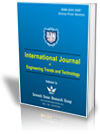Response Time Analysis using Linux Kernel Completely Fair Scheduler for Data Intensive Task
Citation
Mrs. Sunita Dhotre, Miss. Rucha Shankar Jamale, Dr. Suhas .H Patil "Response Time Analysis using Linux Kernel Completely Fair Scheduler for Data Intensive Task", International Journal of Engineering Trends and Technology (IJETT), V49(5),279-286 July 2017. ISSN:2231-5381. www.ijettjournal.org. published by seventh sense research group
Abstract
The modern Linux-based systems with updated operating system are used over a huge range. They provide numerous facilities and features which eventually ease our day to day requirements. However, while providing these variant attributes Response Time of the system increases which affects the systems overall performance.
This paper focuses on estimation and analysis of response time by designing scheduler driven DVFS scheme using a Data Intensive Task. The proposed research defined a solution with respect to Operating System track which is to invoke Dynamic Voltage & Frequency Scaling (DVFS) techniques in Linux scheduler Completely Fair Scheduler (CFS) in collaboration with frequency change which eventually improves response time and system overall performance.
References
[1] A. Gara et al., "Overview of the Blue Gene/L system architecture," in IBM Journal of Research and Development, vol. 49, no. 2.3, pp. 195-212, March 2005.
[2] Barabanov, Michael. A linux-based real-time operating system. Diss. New Mexico Institute of Mining and Technology, 1997.
[3] Le Sueur, Etienne, and Gernot Heiser. "Dynamic voltage and frequency scaling: The laws of diminishing returns." Proceedings of the 2010 international conference on Power aware computing and systems. 2010.
[4] R. C. Garcia, J. M. Chung, S. W. Jo, T. Ha, and T. Kyong, “Response time performance estimation in smartphones applying dynamic voltage & frequency scaling and completely fair scheduler,” Proc. Int. Symp. Consum. Electron. ISCE, vol. 2, no. 2, pp. 1–2, 2014.
[5] F. Lin and W. Ye, "Operating System Battle in the Ecosystem of Smartphone Industry," 2009 International Symposium on Information Engineering and Electronic Commerce, Ternopil, 2009, pp. 617-621.
[6] Lozi, Jean-Pierre, et al. "The Linux scheduler: a decade of wasted cores." Proceedings of the Eleventh European Conference on Computer Systems. ACM, 2016.
[7] Karande, Poonam, S. P. Dhotre, and Suhas Patil. "Task management for heterogeneous multi-core scheduling." Int. J. Comput. Sci. Inf. Technol 5.1 (2014): 636-639.
[8] Sunwook Bae, Hokwon Song, Changwoo Min, Jeehong Kim, Young Ik Eom, “Eimos: Enhancing Interactivity in Mobile Operating System”, Springer, “12th International Conference on Computational Science and its Applications – ICCSA 2012 Salvador de Bahia, Brazil,pp. 238-247, June 2012
[9] J. Wei, E. Juarez, M. J. Garrido, and F. Pescador, “Maximizing the user experience with energy-based fair sharing in battery limited mobile systems,” IEEE Trans. Consum. Electron., vol. 59, no. 3, pp. 690–698, 2013.
[10] J. Wei, R. Ren, E. Juarez, and F. Pescador, “A linux implementation of the energy-based fair queuing scheduling algorithm for battery-limited mobile systems,” IEEE Trans. Consum. Electron., vol. 60, no. 2, pp. 267–275, 2014.
[11] C. S. Wong, I. K. T. Tan, R. D. Kumari, J. W. Lam, and W. Fun, “Fairness and interactive performance of O(1) and CFS Linux kernel schedulers,” Proc. - Int. Symp. Inf. Technol. 2008, ITSim, vol. 3, no. 1, 2008.
[12] Kabugade, Rohan R., S. S. Dhotre, and S. H. Patil. "A Modified O (1) Algorithm for Real Time Task in Operating System."
[13] Kabugade, Rohan R., S. S. Dhotre, and S. H. Patil. "A Study of Modified O (1) Algorithm for Real Time Task in Operating System." Sinhgad Institute of Management and Computer Application NCI2TM (2014).
[14] Pabla, Chandandeep Singh. "Completely fair scheduler." Linux Journal 2009.184 (2009).
[15] P. Pawar, S. S. Dhotre, and S. Patil, “CFS for Addressing CPU Resources in Multi-Core Processors with AA Tree,” Int. J. Comput. Sci. Inf. Technol., vol. 5, no. 1, pp. 913–917, 2014.
[16] Kumar, Avinesh. "Multiprocessing with the completely fair scheduler." IBM developerWorks (2008).
[17] Le Sueur, Etienne, and Gernot Heiser. "Dynamic voltage and frequency scaling: The laws of diminishing returns." Proceedings of the 2010 international conference on Power aware computing and systems. 2010.
[18] Choi, Kihwan, Ramakrishna Soma, and Massoud Pedram. "Dynamic voltage and frequency scaling based on workload decomposition." Proceedings of the 2004 international symposium on Low power electronics and design. ACM, 2004.
[19] Dhiman, Gaurav, and Tajana Simunic Rosing. "Dynamic voltage frequency scaling for multi-tasking systems using online learning." Low Power Electronics and Design (ISLPED), 2007 ACM/IEEE International Symposium on. IEEE, 2007.
[20] Pallipadi, Venkatesh, and Alexey Starikovskiy. "The ondemand governor." Proceedings of the Linux Symposium. Vol. 2. No. 00216. sn, 2006.
[21] Noble, James L., et al. "Adjusting clock frequency and voltage supplied to a processor in a computer system." U.S. Patent No. 5,760,636. 2 Jun. 1998.
[22] Cuervo, Eduardo, et al. "MAUI: making smartphones last longer with code offload." Proceedings of the 8th international conference on Mobile systems, applications, and services. ACM, 2010.
[23] R. Shankar, S. Dhotre, and P. Tanaji, “A Survey on Response Time Analysis Using Linux Kernel Completely Fair Scheduler for Data Intensive Tasks,” vol. 9, no. 44, pp. 351–358, 2016.
[24] P. Tanaji, S. Dhotre, and R. Shankar, “A Survey on Fairness and Performance Analysis of Completely Fair Scheduler in Linux Kernel,” vol. 9, no. 44, pp. 495–502, 2016.
[25] P. T. Patil and P. S. Dhotre, “Response Time Analysis Using Linux Completely Fair Scheduler for Compute-Intensive Tasks,” vol. 5, no. 2, pp. 377–380, 2017.
[26] P. T. Patil and P. S. Dhotre, “Response Time Analysis Using Linux Completely Fair Scheduler for Compute-Intensive Tasks,” vol. 5, no. 2, pp. 377–380, 2017.
[27] Shirazi, Behrooz A., Krishna M. Kavi, and Ali R. Hurson. Scheduling and load balancing in parallel and distributed systems. IEEE Computer Society Press, 1995.
[28] R. Love, "Linux Kernel Development," 2nd Edition, Noval Press, ISBN 0-672-32720-1, 2005.
[29] Silberschatz, Abraham, et al. Operating system concepts. Vol. 4. Reading: Addison-wesley, 1998.
[30] Ezolt, Phillip G. Optimizing Linux (R) Performance: A Hands-On Guide to Linux (R) Performance Tools. Prentice Hall PTR, 2005.
[31] Bovet, Daniel P., and Marco Cesati. Understanding the Linux Kernel: from I/O ports to process management. “O’Reilly Media, Inc.", 2005
[32] Elboth, David. The Linux Book. Prentice Hall PTR, 2001
[33] Sobell, Mark G. A practical guide to Linux commands, editors, and shell programming. Prentice Hall Professional Technical Reference, 2005.
[34] I.Molnar, "Modular Scheduler Core and Completely Fair Scheduler [CFS]," http://lwn.net/Articles/230501.
[35] Red-black trees, “http://www.eli.sdsu.edu/courses/fall95/cs660/notes/RedBlackTree/RedBlack.html#RFToC1” October 1995.
[36] D.Brodowski, "CPUFreq Governors," https://www.kernel.org/doc/Documentation/cpu-freq/governors.txt, Nov. 2013.
Keywords
Response Time, Completely Fair Scheduler (CFS), Dynamic Voltage and Frequency Scaling (DVFS), Governors, Sched.



